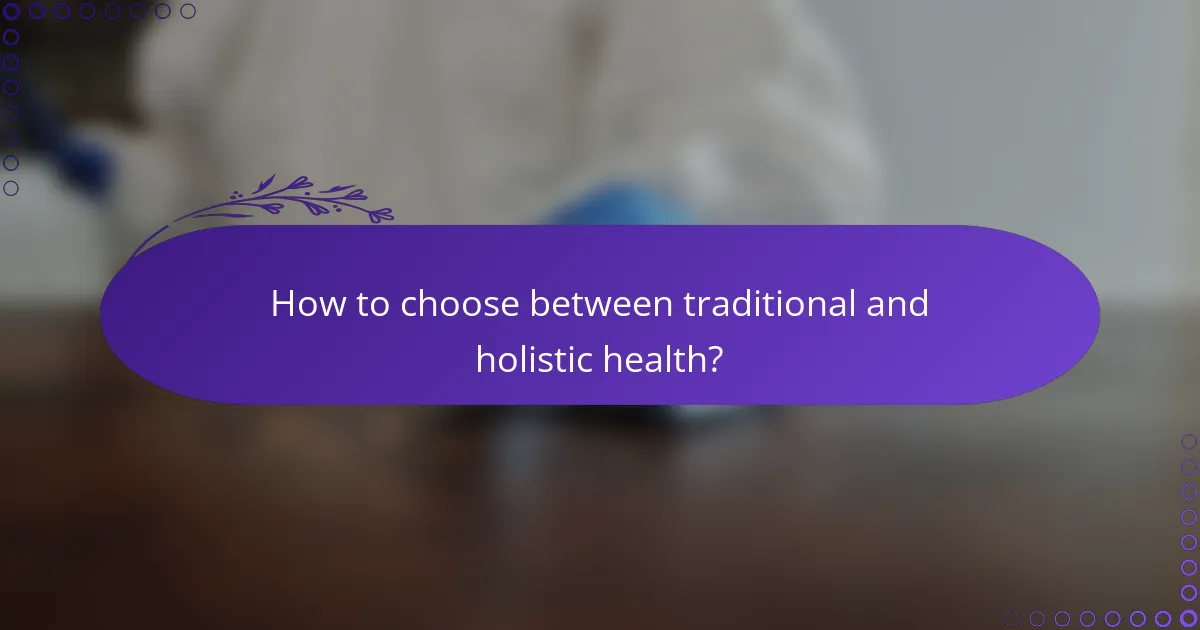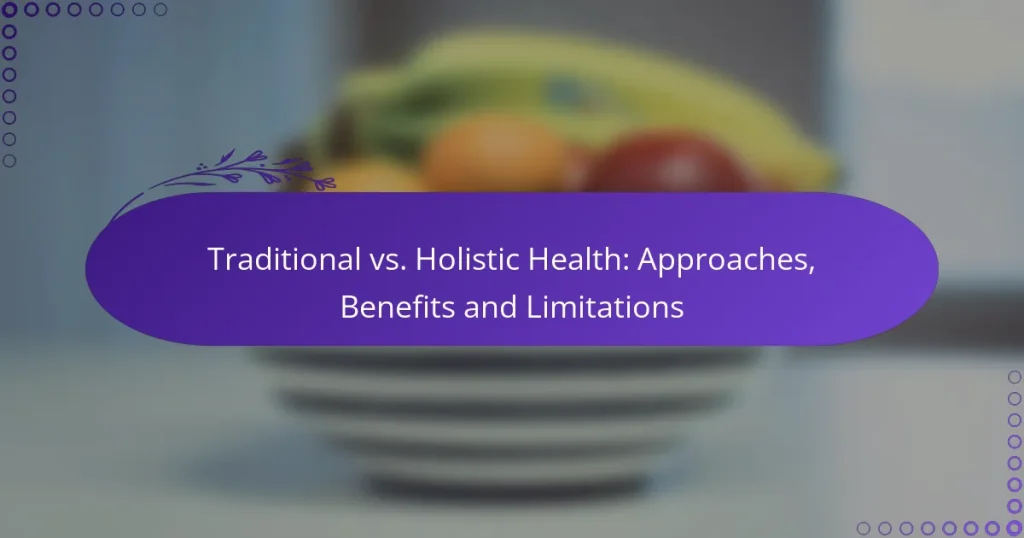The debate between traditional and holistic health approaches highlights distinct methodologies in patient care. Traditional health focuses on established frameworks and evidence-based treatments, while holistic health emphasizes the overall well-being of the individual. Each approach has its benefits and limitations, influencing patient outcomes and experiences in unique ways.

What are the benefits of traditional health approaches?
Traditional health approaches offer several advantages, including a well-established framework for diagnosis and treatment. These methods are backed by extensive research and clinical trials, ensuring a level of reliability and trust among patients and healthcare providers.
Established medical practices
Traditional health approaches are built on established medical practices that have evolved over many years. These practices include evidence-based treatments that have been tested and refined through rigorous scientific study, providing a solid foundation for patient care.
For example, treatments for common ailments like infections or chronic diseases are based on proven methodologies, ensuring that patients receive effective care. This historical context gives patients confidence in the methods being used.
Insurance coverage availability
Many traditional health approaches are covered by health insurance plans, making them more accessible to patients. This coverage often includes visits to primary care physicians, specialist consultations, and necessary medical procedures.
Patients should check their insurance policies to understand what traditional treatments are included, as coverage can vary significantly between providers and plans. This financial support can alleviate the burden of healthcare costs for many individuals.
Access to advanced technology
Traditional health approaches often leverage advanced medical technology, enhancing diagnostic accuracy and treatment effectiveness. Tools such as MRI machines, robotic surgery systems, and telemedicine platforms are commonly used in conventional healthcare settings.
This access to cutting-edge technology allows for more precise interventions and better patient outcomes. For instance, minimally invasive surgeries can reduce recovery times and complications, showcasing the benefits of integrating technology into traditional practices.
Standardized treatment protocols
Standardized treatment protocols in traditional health approaches ensure consistency and quality in patient care. These protocols are developed based on clinical guidelines and best practices, allowing healthcare providers to follow a uniform approach to treatment.
Such standardization helps minimize variations in care, ensuring that patients receive the same high level of treatment regardless of where they seek help. This is particularly important for managing chronic conditions, where adherence to established protocols can significantly improve health outcomes.

What are the benefits of holistic health approaches?
Holistic health approaches offer numerous benefits, focusing on the whole person rather than just specific symptoms. These methods promote overall well-being, personalized care, and preventive measures, leading to improved health outcomes and quality of life.
Focus on overall well-being
Holistic health emphasizes the interconnectedness of the body, mind, and spirit. By addressing physical, emotional, and social factors, individuals can achieve a more balanced state of health. This comprehensive view encourages lifestyle changes that enhance overall well-being.
Practices such as yoga, meditation, and nutrition counseling are often integrated into holistic care, fostering a healthier lifestyle. Individuals may experience reduced stress, improved mood, and enhanced physical health as a result.
Personalized treatment plans
Holistic health approaches prioritize individualized care tailored to each person’s unique needs and circumstances. Practitioners assess various aspects of a person’s life, including medical history, lifestyle, and emotional state, to create customized treatment plans.
This personalized approach can lead to more effective interventions, as treatments are designed to address specific issues rather than applying a one-size-fits-all solution. For example, a treatment plan may include dietary changes, exercise recommendations, and stress management techniques based on the individual’s preferences and health goals.
Emphasis on prevention
Preventive care is a cornerstone of holistic health, aiming to identify and address potential health issues before they develop into serious conditions. This proactive approach encourages regular check-ups, screenings, and lifestyle modifications.
Individuals are often guided to adopt healthier habits, such as balanced nutrition and regular physical activity, which can significantly reduce the risk of chronic diseases. By focusing on prevention, holistic health can lead to long-term health benefits and lower healthcare costs.
Integration of mind-body techniques
Holistic health incorporates mind-body techniques that recognize the impact of mental and emotional health on physical well-being. Practices like meditation, mindfulness, and guided imagery help individuals manage stress and enhance their overall health.
These techniques can improve emotional resilience and promote relaxation, which is essential for maintaining good health. For instance, regular mindfulness practice may lead to lower blood pressure and reduced anxiety levels, contributing to a healthier lifestyle.

What are the limitations of traditional health approaches?
Traditional health approaches often face limitations that can impact patient care and outcomes. These limitations include a reliance on medication, insufficient attention to lifestyle factors, and potentially high costs for patients seeking treatment.
Potential for over-reliance on medication
One significant limitation of traditional health approaches is the tendency to over-rely on medication for treatment. This can lead to patients receiving prescriptions without fully exploring other options, such as lifestyle changes or alternative therapies.
Over-reliance on medication may result in side effects, dependency, or interactions with other drugs, which can complicate a patient’s health. It is essential for healthcare providers to consider a more balanced approach that includes non-pharmaceutical interventions.
Limited focus on lifestyle factors
Traditional health approaches often prioritize diagnosing and treating specific ailments, which can result in a limited focus on lifestyle factors that contribute to overall health. Factors such as diet, exercise, and stress management are sometimes overlooked in favor of immediate medical solutions.
Addressing lifestyle factors can significantly enhance health outcomes. For example, incorporating regular physical activity and a balanced diet can prevent chronic diseases, making it crucial for healthcare providers to integrate these elements into patient care.
Higher costs for patients
Another limitation of traditional health approaches is the potential for higher costs associated with medical treatments and medications. Patients may face significant expenses for consultations, diagnostic tests, and ongoing prescriptions, which can strain their finances.
In some cases, insurance may not cover certain treatments or medications, leading to out-of-pocket expenses. Patients should explore all available options, including preventive care and holistic approaches, which may offer more cost-effective solutions for maintaining health.

What are the limitations of holistic health approaches?
Holistic health approaches have several limitations that can affect their effectiveness and acceptance. These include a lack of scientific validation, potential for unregulated practices, and challenges with insurance coverage.
Lack of scientific validation
Many holistic health practices do not have robust scientific evidence supporting their efficacy. This absence of empirical data can lead to skepticism among healthcare professionals and patients alike. For example, while some herbal remedies may offer benefits, their effects are often anecdotal rather than proven through rigorous clinical trials.
Without scientific validation, it can be challenging for patients to make informed decisions about their health. Individuals should critically evaluate the evidence behind holistic treatments and consult with qualified professionals before pursuing them.
Potential for unregulated practices
Holistic health practices can vary widely in quality and safety, as many are not regulated by formal standards. This lack of regulation can lead to the proliferation of ineffective or even harmful treatments. For instance, practitioners may offer therapies without adequate training or credentials, putting patients at risk.
To mitigate these risks, individuals should seek practitioners who are certified by recognized organizations and have a proven track record. Researching the qualifications and reviews of holistic providers can help ensure a safer experience.
Insurance coverage challenges
Insurance coverage for holistic health approaches is often limited or non-existent, making them financially burdensome for many patients. While some plans may cover specific therapies like acupuncture or chiropractic care, others may not include any holistic services at all. This can lead to out-of-pocket expenses that can be significant over time.
Patients should check their insurance policies carefully to understand what is covered and consider discussing holistic options with their providers. Exploring flexible spending accounts or health savings accounts may also provide financial relief for holistic health expenses.

How to choose between traditional and holistic health?
Choosing between traditional and holistic health approaches depends on individual preferences, health goals, and treatment effectiveness. Traditional health often focuses on symptom management through medications, while holistic health emphasizes overall well-being and natural remedies.
Assess personal health goals
Begin by identifying your specific health goals. Are you looking for symptom relief, long-term wellness, or preventive care? Traditional health may be more suitable for acute conditions, while holistic approaches can be beneficial for chronic issues or overall lifestyle improvements.
Consider your comfort level with various treatment methods. If you prefer natural remedies and lifestyle changes, holistic health may align better with your values. Conversely, if you seek immediate results through established medical practices, traditional health could be the right choice.
Consider treatment effectiveness
Evaluate the effectiveness of treatments based on your health conditions. Traditional health often relies on clinical studies and established protocols, which can provide quick relief for many ailments. Holistic health, however, may take longer to show results as it focuses on the body’s natural healing processes.
Research and consult with healthcare professionals to understand the success rates of both approaches for your specific needs. Keep in mind that some individuals may benefit from a combination of both methods, utilizing traditional treatments alongside holistic practices for a more comprehensive approach to health.

